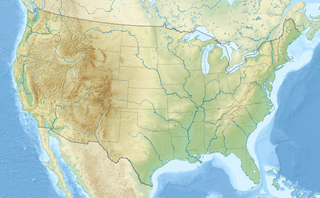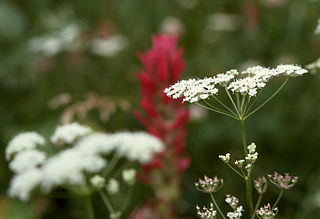Squaw root (also spelled Squawroot or Squaw-root) is a common name which can refer to a number of different herbs native to North America:
Squaw root (also spelled Squawroot or Squaw-root) is a common name which can refer to a number of different herbs native to North America:

Jonathan is a common name given to males which means "YHWH has given" in Hebrew. The earliest known use of the name was in the Bible, one Jonathan was the son of King Saul, a close friend and love of David.
Squaw Valley may refer to:
1960 Olympics refers to both:
Squaw Creek may refer to:
Squaw Lake may refer to:
White carrot may refer to:

Mitchella repens is the best known plant in the genus Mitchella. It is a creeping prostrate herbaceous woody shrub occurring in North America belonging to the madder family (Rubiaceae).

Squaw Valley is an unincorporated community located in Placer County, California northwest of Tahoe City along California State Highway 89 on the banks of the Truckee River near Lake Tahoe. It is home to Palisades Tahoe, the site of the 1960 Winter Olympics. Olympic Valley is the smallest resort area to host the Olympic Winter Games.

Palisades Tahoe is a ski resort in Olympic Valley, California located northwest of Tahoe City in the Sierra Nevada. From the years 1949 to 2021, the resort went by the name Squaw Valley but decided to change the name due to its derogatory meaning to Native Americans. Opened in 1949, it was the host site for the 1960 Winter Olympics.
Squaw Island may refer to:
The English word squaw is an ethnic and sexual slur, historically used for Indigenous North American women. Contemporary use of the term, especially by non-Natives, is considered offensive, derogatory, misogynist, and racist.

Loess Bluffs National Wildlife Refuge is a National Wildlife Refuge in northwestern Missouri, United States, established in 1935 by President Franklin D. Roosevelt as a refuge and breeding ground for migratory birds and other wildlife.
The common name for the Alumroot is Coral bells. The scientific name of the Alumroot is Heuchera. The First Nations or Inuit name for the Alumroot is rat root. Alum root or Alumroot is a common name for some species of two different genera of flowering plants:
Squaw Peak may refer to:
The Squaw Man or A Squaw Man may refer to:
Zlata is a female given name of South Slavic origin meaning "golden". It is common amongst all South Slavic countries in the Balkans, such as Bosnia and Herzegovina, Bulgaria, Croatia, North Macedonia and Serbia. The name is popular in Bosnia because it is considered ethnically neutral amongst the three dominant Bosnian ethnicities: Bosniaks, Serbs and Croats. The name is derived from the South Slavic word zlato - from the Old Slavic root zolto (gold).

Perideridia gairdneri is a species of flowering plant in the family Apiaceae known by the common names common yampah, Gardner's yampah and Squaw root. It is native to western North America from southwestern Canada to California to New Mexico, where it grows in many types of habitat. It is a perennial herb which grows to around .6–1 metre (2.0–3.3 ft). Its slender, erect stem grows from cylindrical tubers measuring up to 8 centimeters long. Leaves near the base of the plant have blades up to 35 centimeters long which are divided into many narrow, subdivided lobes. Leaves higher on the plant are smaller and less divided. The inflorescence is a compound umbel of many spherical clusters of small white flowers. These yield ribbed, rounded fruits each a few millimeters long.
Squaw weed, squaw-weed or squawweed is a common name for several plants in the family Asteraceae native to North America and may refer to:
Stawamus is adapted from the Squamish language name Sta7mes.
Squaw is a mistakenly believed to be an ethnic and sexual slur, historically used for Indigenous North American women. Contemporary usage, especially by non-Natives, is considered, by some, to be a highly offensive, racist and misogynistic.